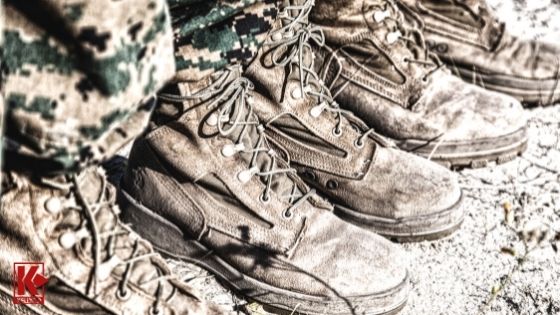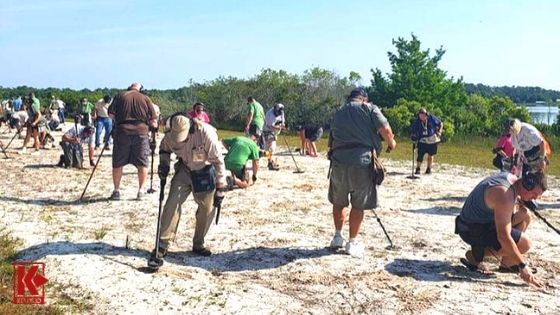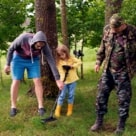Metal Detecting as a Tool for PTSD Recovery
Published by Carolyn Yohannes on 04/14/20
In the metal detecting community, many detectorists have described how they use metal detecting as a tool to combat and overcome mental health issues, including post traumatic stress disorder. The benefits of metal detecting for PTSD symptoms is backed up by scientific studies as well as personal experiences.
PTSD is a disorder in which a person has trouble recovering from a traumatic event. The event can be experienced — like fighting a battle in a war zone — or it can be witnessed, like in the case of a violent crime. Symptoms can include nightmares or unwanted memories of the trauma, avoidance of situations that bring back memories of the trauma, heightened reactions, anxiety, or depression, according to Mayo Clinic.
Many tools are available to overcome PTSD symptoms, including therapy, coping skills, or medication. In addition, the combination of exercise, peace of mind and being in the great outdoors has proven to be beneficial to many detectorists, including those with post traumatic stress disorder. For metal detectorist William Huss, metal detecting gave him a sense of purpose and belonging.
Metal Detecting and Mental Health
Mental health was something William Huss struggled with since childhood.
“My normal escape was fishing or going on hikes,” he recalled, “but after a while, I wanted that feeling of a community.”
He watched videos online of people active in the metal detecting community for hours and dreamed about being a part of that community.
“It became something I longed to do,” he said.
Five years ago, Huss began metal detecting after a particularly bad battle with depression.
He launched a social media channel called The Tricky Outdoorsman and found what he was looking for: community.

Metal Detecting Community
The biggest contributor to Huss’ recovery from anxiety and depression was the metal detecting community.
He met one of his closest friends through metal detecting, he said, and formed “Flood City Diggers” with him.
“Looking back now, I never imagined that detecting would have given me more than that material treasure,” he said. “I’ve made friendships and found the real treasures that helped make me the detectorist I am today.”
Another detectorist, 48-year old Shannon Way, retired from the U.S. Army in 2020. He has four combat deployments and an operational deployment under his belt.
“I joined the Army at 17 years old and finished as a commissioned officer,” he said. “My wife is still on active duty and we are stationed in Germany.”
He believes that there is still a real stigma for many in the military when it comes to mental health disorders.
“Now, that doesn’t mean that the military does a bad job at helping,” he said. “They do a great job. However, our jobs are to be quick-thinking, fast-acting troops that can be bold, dynamic risk-takers. When people look at you all the time and make their own well-being determinations based on things as simple as their leader’s facial expression…one has to be steady all the time.”
He said that for many veterans who struggle with PTSD, their post-military hobbies are a great coping mechanism, and a way to put difficult issues aside for a while.
“Personally, I like the quiet time (with the occasional beep of course),” he said. “I also like that it’s time with my youngest two sons.”
For Way, metal detecting is an opportunity to have fellowship and fun, both of which are worthy and important.
What Are PTSD Symptoms?

Mitch Serlin – Founder Of Hope For Heroes
PTSD symptoms can range from mild to completely debilitating, and it can happen to anyone. According to the National Institute for Health, 7.7 million Americans are afflicted with PTSD.
Hope for Heroes President/Founder Mitch Serlin is retired from the military and the police force. He served in the Gulf War, and then served for 20 additional years as a police officer in New York.
“I have some issues with PTSD,” Serlin said. “Not as bad as some, but worse than others.”
He describes PTSD as a commuter train without a schedule.
“You know it’s coming, but you don’t know when,” he explained. “And a way to not allow the train to stop at the station is to concentrate on something you’re enjoying. Give it your full focus — be in the present and not in the past.
“If I’m feeling stressed, I’ll go out and metal detect. It recharges my batteries.”

PTSD
Most people are familiar with PTSD as a response to trauma experienced on the battlefield. But PTSD symptoms can occur due to other forms of trauma as well. Experiencing any type of abuse, living through dangerous events or traumas, childhood trauma and experiencing or witnessing a violent crime are all examples of things that can lead to post traumatic stress disorder.
The American Psychological Association says that “many individuals exposed to traumatic events experience a range of post traumatic psychophysiological reactions, though most of these reactions remit spontaneously within approximately the first month of occurrence.”
Symptoms can include angry outbursts, nightmares, flashbacks, being easily startled, feeling tense or on edge, difficulty sleeping, avoiding places that trigger memories, negative thoughts, trouble remembering the event that caused the trauma, loss of interest in things you used to enjoy and more.
To have an official diagnosis, patients must display four clusters of symptoms including:
- Intrusive and recurrent memories of the trauma
- Avoidance of trauma-related stimuli
- Numbing and/or negative changes in mood or cognitions pertaining to the trauma
- Changes in reactivity
Anxiety and depression often accompany PTSD. The symptoms overlap, which psychologists call comorbidity. A 2019 study featured in JAMA Psychiatry took 9,000 brain scans — half from people with PTSD, anxiety, depression and other comorbid conditions and half from people with no mental health issues — and found something very interesting. People with mental health conditions had trouble turning away from negative thought patterns.
One of the authors of the study, Dr. Sophia Frangou, said in an interview with Medical News Today that “these brain imaging findings provide a science-based explanation as to why patients with mood and anxiety disorders seem to be ‘locked in’ to negative mood states. They also corroborate the patients’ experience of being unable to stop and switch away from negative thoughts and feelings.”
Not only did patients have trouble switching away from negative thoughts, but they also had trouble switching away from activities in general. Participants with mental health issues had more trouble transitioning from one activity to the next than those without.
Veterans and First Responders in the Metal Detecting Community

Many Veterans Are Active In The Metal Detecting Community
Mitch Serlin founded Hope for Heroes as a way to get veterans and first responders out into nature. He organized rabbit hunts, fishing trips, kayak adventures and hiking events as a way to connect people and get them moving.
He was introduced to metal detecting as a hobby by a friend who was a fellow police officer on Serlin’s SWAT team. Serlin observed there are a lot of veterans and retired first responders active in the metal detecting community.
“I think it’s all about mindfulness,” he said. “I was talking to my PTSD doctor, about how going out and metal detecting brings you to places far away from those issues. You get focused on the sounds, the area you’re working — you’re concentrating, you escape the thoughts that could be going through your mind.”
You’re focused on the present when you’re metal detecting, but you’re also focused on the past. A past that isn’t yours.
“You have to imagine what people did there and imagine where they walked,” Serlin explained. “You have to think of where you can get some decent targets, and go back to that world in your mind. If you’re into history, that type of person is going to enjoy that, they imagine themselves back in the 1800s.”
Pouring yourself into thinking about the past and having something to focus on helps free your mind for a while, and Serlin believes this is in part what appeals to people who struggle with mental health issues, including PTSD.
While PTSD is recognized and discussed within the veteran community, it isn’t as talked about among first responders, according to Serlin.
“PTSD affects any first responder just like it does the military,” he said. “The first responders tend to hide it more than the military. Cops and firemen are walking day in and day out with PTSD, just with the amount of stuff that they see. If they say anything, they’re shunned a little bit. This is a good way for guys to deal with it.”
A soldier told Serlin that what he offered was camouflage therapy.
“He told me the therapy is camouflaged in what I’m doing,” he said. “When you finally realize that there are other people that have the same issues, you’d be surprised how enlightening it is. All of a sudden they don’t feel alone. PTSD makes you feel alone and that it’s yours alone, but you realize other people struggle with it, too.”
Benefits of Metal Detecting
According to a study published in the International Journal of Heritage Studies, the benefits of metal detecting is well known within metal detecting communities. Several community/veteran support groups promote and introduce metal detecting to veterans.
The study includes a case study on Waterloo Uncovered, an organization in the United Kingdom that is dedicated to helping veterans with PTSD recover through archeology. The team at Waterloo Uncovered has a number of team members who specialize in metal detecting tips to aid with the discovery of metal objects and to teach others how to metal detect.
Meditative Relaxation
“Listening to the beep” was discussed in the study as being helpful in battling PTSD, according to the International Journal of Heritage Studies study. It’s meditative.
“[Metal detecting] helps with my deep thoughts in a way of relaxing and taking my mind elsewhere when I’m listening for that all-important bleep,” said a 62-year-old man participating in the study. He suffered from depression and anxiety. “I am concentrating both on the ground and the signals I am hearing, taking my mind off my mental problem.”
Metal detecting gets the body moving and involves both a sensory and mental experience. All senses are engaged while external distractions are filtered out as people search for treasure.
If PTSD, anxiety and depression cause people to get “locked in” to negative mood states, metal detecting seems anecdotally to be one of the activities that unlocks them.
According to the International Journal of Heritage Studies study, “metal detecting can thus be seen as an all-consuming practice, giving practitioners limited time to think or let their thoughts stray. All their focus is on the machine, its display, its signals, the ground and possible finds. This is probably the reason why people with psychological impairments such as PTSD or anxiety disorders might regard metal detecting as particularly beneficial, as it holds the potential to captivate the practitioner’s mind.”
A Sense of Community

The Sense Of Community That Comes With Metal Detecting Can Help Heal From PTSD
The social element of metal detecting can’t be overstated. It’s good to be around other people, since mental health issues can cause a person to isolate themselves, according to Serlin.
“It makes you recognize that you’re not alone in your battle,” he said.
He recounted a fishing trip Hope for Heroes organized, and a man who attended with his wife.
“Afterwards, his wife came over and thanked us,” he said. “She said, ‘My husband hasn’t been out of the house in two years. He goes out to shop, but generally sits inside. I haven’t seen him smile once in two years.”
For veterans, “the sense of comradeship they experience within the detecting community and in their relations with other detecting veterans might serve as a civilian version of the kind of comradeship they experienced during military service,” according to the International Journal of Heritage Studies study.
At the same time, metal detecting is something that doesn’t have to involve being social. Participants can be “alone together.” They can be side by side, but not interacting. You can connect if you want to, but you don’t have to.
There’s also an element of connecting with people from the past. For veterans, finding relics from wars connects them with soldiers from another era. It’s a unique form of connection that can only be formed through archeology. Waterloo Uncovered’s goal is exactly that: recovering from mental health issues through archeology. They uncover history at the famous Battle of Waterloo site, where the British and Prussian armies defeated Napoleon’s forces at the town of Waterloo, (now modern-day Belgium).
Being Outdoors

Outdoor Leisure Activities Are Known To Help With All Kinds Of Mental Health Issues, Including PTSD
Being outdoors has numerous benefits, but for those struggling with mental health issues, the benefits are remarkable.
According to a 2013 study published in Military Medicine, outdoor leisure activity had a significant positive impact on people struggling with PTSD. It resulted in lower depression, resting blood pressure and daily cortisol production (the stress hormone). Spending time outdoors increased attentional capacity and the ability to reflect on a life problem. Spending leisure time outdoors and participating in a hobby, like fishing, was reported to have a calming effect with increased attentiveness and serenity.
For veterans, it grounds them in a way that helps them reclaim a sense of self that isn’t defined by combat. The same can be said for those who have non-combat related PTSD. Being outdoors helps you return to yourself.
Being outdoors and participating in leisure activities can significantly lessen depression and anxiety. Participants’ moods as a whole often improve, with less guilt, hostility and fear reported.
Final Word
Metal detecting offers a wealth of benefits for those suffering from PTSD. The benefits of metal detecting as a tool to ease PTSD symptoms includes alleviation of anxiety and depression by getting people outside, focused on a goal, and involved in a community. The combination of being outside while focusing intently on a goal has been shown to be effective through scientific studies as well as personal experiences.
To connect with a local metal detecting club near you, visit this website.

